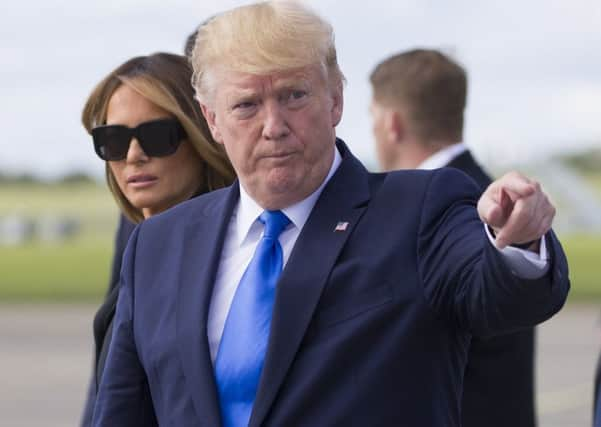How high a price are we paying for trade deals with our ‘friends’? – Helen Martin


Trump’s visit last week was both comedic and scary. One minute the NHS was going to be “on the table” (or down the pan) according to The Donald. Then, presumably under advice, he accepted it wouldn’t be on the table at all.
His conversation with the Irish Taoiseach was very funny, as he compared the Irish border to his Mexican Wall.
Advertisement
Hide AdAdvertisement
Hide AdAnd there are fears that we would become an extra state of the US if we became dependant upon trade with such a nation that has different priorities and concerns to our own.
Right now, we are still in the EU. But as far as I can see one of our biggest trade deals is with China. I spent exactly five minutes looking at origins of varied products around my house.
Green make-up concealer to reduce red cheeks? Made in China. The “clearomizer” tank for my vaping habit? Made in China. Several clothing items and a pair of slippers? Made in China. Gadgets including a Sky microfilter and our broadband hub? Made in China.
Turns out the EU is China’s greatest trading partner. Yet the US and China are in a trade war. How complicated are things going to get if the UK locks in with Trump?
Advertisement
Hide AdAdvertisement
Hide AdActually, we already deal with 47 countries outside the EU, not necessarily free trade, of course, some approved by the EU.
And having all these deals, especially the most successful ones, means that as a country, it’s awkward – or forbidden – to protest loudly against their customs and national actions which we find unacceptable and horrific. Saudi’s human rights record and the Japanese restarting commercial whaling are well publicised.
China’s approved dog and cat meat industry is less commonly known. Every year ten million dogs and four million cats (some stolen pets still wearing their collars) are snatched from streets, crammed into cages, injured, starved and dehydrated, before being boiled alive to remove skins, ultimately sold as a food product.
Just three examples of “trading pals”? There are many more.
Presumably condemning such activities and businesses their governments condone and accept wouldn’t help or facilitate trade deals. Try to throw out everything you have made in China and you’ll wind up in an almost empty house with no broadband.
Advertisement
Hide AdAdvertisement
Hide AdGovernments and economists probably understand more about global trade than the man or woman in the street, and don’t want to muck it up by horrifying the public.
But our industries, manufacturers, exporters and traders depend on these deals too, therefore millions of jobs would be at stake if deals stopped.
When it comes to the US, we don’t want chlorinated chicken, hormone plussed beef, or a vital partnership with a country that poo-poos environmental, climate and planetary decay; things we might well be adding to by buying their goods.
But that’s globalisation. The UK is not self-sufficient and nor are most other countries.
It’s true, we don’t understand the intricacies of global trade. And probably, the less we learn about it all, the better.